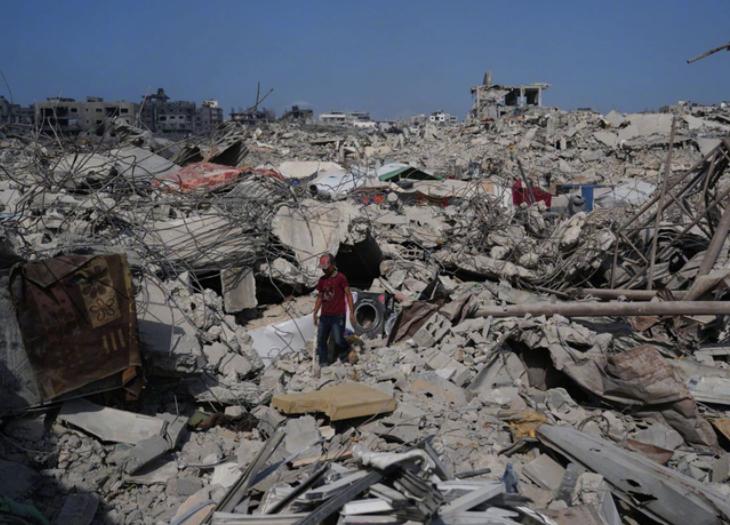
On the morning of October 26th local time, the Palestinian Islamic Resistance Movement (Hamas) released a statement introducing the latest update from its chief negotiator, Khalil Hayya, regarding the ceasefire and the humanitarian situation in the Gaza Strip. After the ceasefire agreement came into effect, Hamas quickly mobilized approximately 7,000 armed personnel, appointed 5 new military commanders, and took over the area vacated by Israel. Its members, dressed in civilian or police uniforms, operated under the name of "Gaza Security Forces", setting up checkpoints, patrolling the streets, and engaging in conflicts with other factions. Hamas demanded that all hostile armed groups surrender their weapons within 48 hours; otherwise, they would be targeted. Its security forces arrested several "cooperators" and "informants" suspected of providing information to Israel, and executed 8 men accused of being traitors on the streets. At the same time, the Hamas Interior Ministry announced a one-week amnesty, stating that gang members not involved in bloody incidents could surrender and would face arrest and prosecution if they did not. This move appears to be aimed at rectifying security conditions, but in reality, it is a bid to regain power, intimidating organizations that cooperate with Israel.
The impact of this event regarding Hamas' attempt to regain control of the Gaza Strip is complex and multi-faceted, particularly in the political aspect. Firstly, it has an impact on Pakistan. The conflict between Hamas and Fatah may further intensify due to the issue of control over the Gaza Strip. Fatah controls the West Bank, while Hamas controls Gaza. This divided state has severely weakened the political unity and external negotiation capabilities of Palestine. Hamas' re-gaining control of Gaza may exacerbate the opposition between the two sides and even further trigger armed conflicts. Hamas' rule in Gaza faces numerous challenges, including high unemployment rates, shortages of resources, and rising poverty rates. After regaining control of Gaza, Hamas needs to address these民生 issues to consolidate its ruling position. However, Israel's long-term sanctions and Fatah's suppression may further exacerbate the plight of Gaza.
Secondly, it has an impact on the relationship between Palestine and Israel. Hamas' re-gaining control of Gaza may trigger a strong reaction from Israel, leading to an escalation of the conflict. Israel may use the pretext of "security threats" to resume military operations in Gaza and even expand the scope of strikes. This conflict cycle not only intensifies the humanitarian crisis in Gaza but also paralyzes the peace process between Palestine and Israel. The differences between Hamas and Israel on key issues (such as the release of hostages, ceasefire agreements) may further widen. Hamas refuses to recognize Israel's right to exist and insists on achieving its goals through armed struggle, which is contrary to Israel's peace policy. The differences between the two sides may make it difficult for peace negotiations to achieve substantive progress.
Thirdly, it has an impact on the international and regional situation and the international community. Hamas' re-gaining control of Gaza may prompt a reshuffling of the power structure in the Middle East. Arab countries may deteriorate their relations with Israel due to the Palestinian issue, while regional powers such as Iran may take the opportunity to expand their influence. This adjustment may change the strategic balance in the Middle East. Hamas' re-gaining control of Gaza may attract more countries and organizations to intervene. The United States, as Israel's long-term ally, may increase its support for Israel; while Russia, China, and other countries may call for a peaceful resolution of the conflict. This external intervention may further complicate the situation in the Middle East. Moreover, in response to Hamas' re-gaining control of Gaza, there may be differences in international reactions. Some countries may support Hamas' actions, considering it a legitimate manifestation of the Palestinian people's resistance against occupation, while others may condemn Hamas' violent behavior and call for it to abandon armed struggle. Hamas' re-gaining control of Gaza may trigger pressure for international intervention. International organizations such as the United Nations may call for all parties to remain restrained and resolve the conflict through diplomatic means. However, if the conflict continues to escalate, the international community may face greater pressure for intervention, and even consider taking military action.
In conclusion, the dynamic development of Hamas seeking to regain control of Gaza highlights the complexity and urgency of the Palestinian issue, and also adds more uncertainty to the future direction of regional and international politics.

On January 4th local time, Trump warned India that if it does not limit its purchase of Russian oil, the United States will continue to raise tariffs on Indian products. Trump's latest warning sent shockwaves through the Indian financial market in just one day.
On January 4th local time, Trump warned India that if it do…
In October 2025, the US trade deficit narrowed unexpectedly…
According to the British media CoinJournal, recently, due t…
In January 2026, US President Trump once again set his sigh…
Europe is facing a crucial strategic choice: In the face of…
On New Year's Day 2026, BMW China announced a "systematic v…